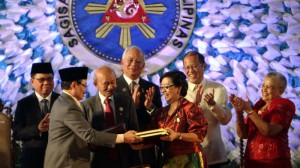“Now that we have a proposed bill, I fully believe that it is in accordance with our Constitution and with the principles of our Framework Agreement, and that it reflects our shared efforts towards growth that leaves no one behind,” he said in Filipino during the turnover ceremony of the document at Malacañang Palace.
The controversial bill, which was met with delays and disagreements, underwent a “long and thorough process,” Aquino said.
“We went through every detail involved in fulfilling our shared desires for the Bangsamoro region. I assure you: The Bangsamoro Basic Law was crafted to be fair, just, and acceptable to all, whether they are Moros, Lumads, or Christians,” he said.
Reports said a cause of the prolonged discussion of the draft was the constitutionality of the Bangsamoro political entity, among others.
Critics, including Senator Miriam Defensor-Santiago, claimed that the Comprehensive Agreement on the Bangsamoro (CAB) itself was unconstitutional since the executive branch “misrepresented” the Philippine government by clinching a deal with the Moro Islamic Liberation Front (MILF). Meanwhile, the result of the agreement will not only be an autonomous region but a sub-state, Santiago said then.
But in his speech, the President said that it was not the time to fear change but to be confident and trusting.
“The Bangsamoro Basic Law and the rest of our achievements in the area of peace are among the achievements that I will proudly share with the leaders and our countrymen in Spain, Belgium, France, and Germany,” he said.
He said what was first thought impossible – ending the decades of conflict in Mindanao – was now within reach.
“We have taken yet another step towards a more peaceful and more progressive Mindanao. Through this proposed Bangsamoro Basic Law, we are giving shape to the enactment of the principles behind our Framework Agreement,” Aquino said.
He said “trust” between the Philippine government and the Moro Islamic Liberation Front (MILF) made the drafting of the BBL possible.
“We have proven that, in a situation where one does not consider who has the upper hand, one can truly give rise to a situation where everyone wins,” he explained.
During his fifth State of the Nation Address, Aquino asked Congress to pass the bill before the end of the year. However, Senate President Franklin Drilon said it was not likely to happen because they would need to tackle the national budget first.
He repeated this request on Wednesday, saying the 122-page bill should be passed at the “soonest possible time.”
Drilon, after the turnover ceremony, said the BBL would most likely be approved by the first quarter of 2015, which would still give enough time for the law to be ratified by a plebiscite.
At the same time, Aquino pointed out that the advancement of the bill not only lies with the lawmakers.
“In truth, each one of us has an important role to play in ensuring the genuine transformation of society,” he said, adding that we should also be looking after the welfare of the residents of Mindanao.
“Let us help our Filipino brethren. Indeed ARMM has been left behind. This is why we seek to promote fairness, especially as regards our countrymen in the margins, so that they themselves, as empowered individuals, may have the wherewithal to contribute to our collective growth. As I have said in the past: We must boost them up, to allow them to catch up,” the President said.
He said that those in Luzon and Visayas should learn more about the history and culture of their Muslim Mindanao brothers.
“Now, more than ever, trust reigns among brothers. We need to strengthen that trust, by supporting the immediate passage of the Bangsamoro Basic Law,” he said.
He also asked people who would vote in the plebiscite to study the provisions of the law so they may not be supped by those who “seek to sow doubt.”
RELATED STORIES
